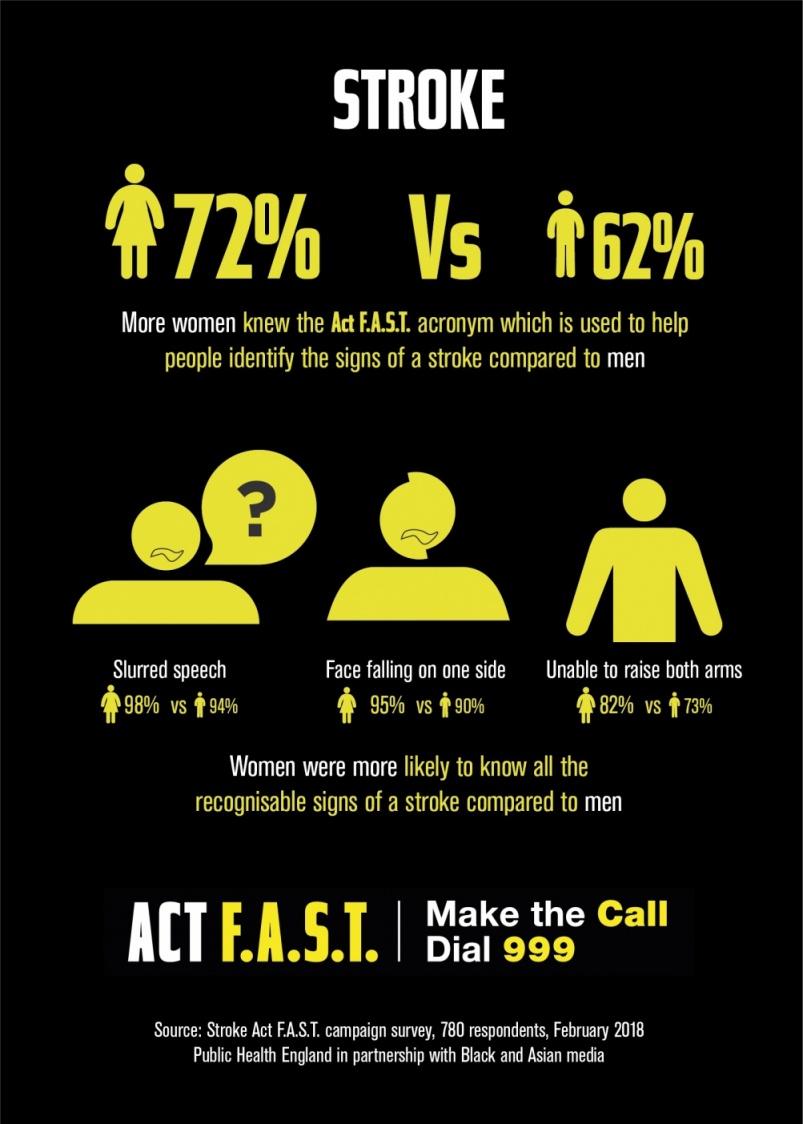72% of women knew the Act F.A.S.T. acronym which is used to help people identify the signs of a stroke compared to 62% of men, a new Stroke survey reveals.

Only 86% of men surveyed knew the three most common signs of a stroke compared to 91% of women.
Most people (84%) were aware that the faster stroke patients receive medical treatment the greater their chances of a better recovery, but shockingly almost 40% are not aware that getting treatment fast can help avoid long-term disability.
Older people aged 55-74 are more likely to have a stroke but were less likely to be aware that getting treatment fast could save a person’s life.
Knowing any single one of the signs of a stroke and calling 999 immediately if you spot one is crucial – the faster you act the better the chances of a good recovery. However a new survey reveals that women were more likely to know the three most common signs of a stroke compared to men, despite men being at a higher risk of having a stroke at a younger age than women. Women were also found to have more knowledge of the Act F.A.S.T. acronym which is used to help people identify the signs of a stroke (72% women vs 62% men). F.A.S.T. stands for:
- Face – has their face fallen on one side? Can they smile?
- Arms – can they raise both their arms and keep them there?
- Speech – is their speech slurred?
- Time – time to call 999
The survey designed specifically for Black and Asian communities to understand the current levels of knowledge about stroke highlight that some of the key Act F.A.S.T. stroke campaign messages are getting through but there’s still more work to be done.
Stroke is a medical emergency, however woman were more likely than men to say that they would seek help quickly if they notice someone showing the signs of a stroke. The Act F.A.S.T. stroke campaign stresses the importance of acting fast and calling 999 as soon as you see even one of the signs developing in yourself or someone else.
While most people (84%) were aware that the faster stroke patients receive medical treatment the greater their chances of a better recovery, surprisingly, almost 40% were not aware that getting treatment fast could help avoid long-term disability. Treatment is more effective if it is received within 3 hours of the onset of a stroke.
Professor Julia Verne, Public Health England Director: “We’d like to thank the media for getting behind this survey and everyone who participated, the response has been great. The results show that some of our ACT F.A.S.T. messages are getting through to those most at risk of stroke. However, it’s clear that we need to work harder to increase awareness of all the common signs of stroke and improve understanding that acting fast can save lives and prevent long-term disability.”
Baroness Floella Benjamin: “I’m pleased that our community has taken time out to participate in this survey. The results are fascinating and interesting. It’s great to know that we have high levels of awareness of the stroke signs but we must not be complacent. We need to do more to make sure that we continue to spread awareness of all the signs and encourage everyone to act fast, without delay when they notice any one of the signs of stroke. I hope these results will go a long way to help inform future ACT F.A.S.T. campaigns.”
Kindly follow us on twitter:@AfricanVoice2









